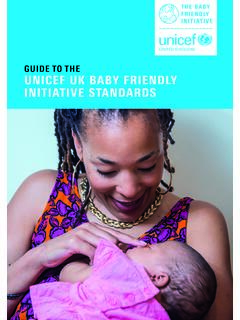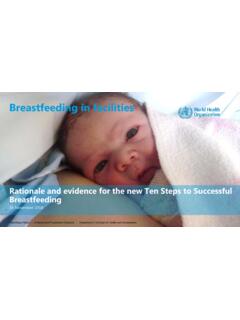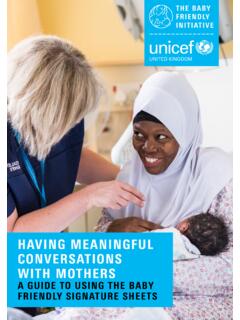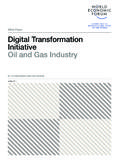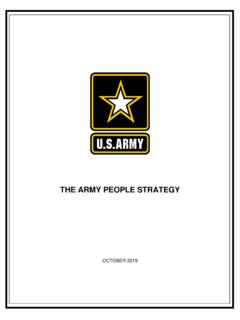Transcription of Barriers to Breastfeeding Briefing Document - UNICEF UK
1 Page 1 REMOVING THE Barriers TO Breastfeeding : A CALL TO ACTION HOW REMOVING Barriers CAN GIVE BABIES ACROSS THE UK THE BEST START IN LIFEThe UK has some of the lowest Breastfeeding rates in the world. Breastfeeding is viewed by many as difficult to achieve and largely unnecessary because formula milk is seen as a close second best. Additionally, it is a highly emotive subject because so many families have not breastfed, or have experienced the trauma of trying very hard to breastfeed and not succeeding. For Breastfeeding to become the normal way to feed a baby in the UK, mothers need face-to-face, ongoing, predictable support from pregnancy through to the early weeks and months. A truly coordinated approach across all services and systems is required. This must not only continue to address the need for sustained improvement in health services, but also consider wider community initiatives, including welcoming Breastfeeding in public places and educating children and adults about the value of Breastfeeding .
2 Special attention is needed in policies designed to protect and support the most vulnerable, such as babies born preterm or sick, into the most disadvantaged families, or to mothers suffering with poor mental health, as these are the babies who are least likely to be breastfed, while needing it the most. Breastfeeding is associated with a 13% reduction in child overweight or obesity, which is strongly linked with obesity into adulthood. The annual cost of treating obesity-related illnesses through the NHS is estimated at As well as its value for physical health, Breastfeeding has a profoundly positive impact on the mental health of both baby and mother. Between 10 and 20% of women are affected by mental illness either during pregnancy or in the 12 months after giving birth, costing the NHS around billion a year; Breastfeeding can help to reduce this Whilst the number of women starting to breastfeed has been increasing, there are large social and demographic variations.
3 Only 1% of women maintain exclusive Breastfeeding to six months as recommended by WHO/ UNICEF and the UK Health Departments,3,4,5,6,7 and only 34% of babies are receiving any breastmilk by six months, compared to 49% in the US and 71% in We know that eight out of ten mothers will stop Breastfeeding before they want to. The reasons for this include: a lack of access to support services in the community and at work, cultural Barriers and misinformation. Together, we can remove the practical, emotional and cultural Barriers to Breastfeeding , and create an enabling environment for all women who want to breastfeed. UNICEF UK CALLS ON THE UK AND ALL DEVOLVED GOVERNMENTS TO: 1. Develop a National Infant Feeding Strategy Board, tasked with creating a strategy and plan to deliver the goal of ensuring more babies are breastfed 2. Include actions to promote, protect and support Breastfeeding in all policy areas where Breastfeeding has an impact 3. Implement evidence-based initiatives that support Breastfeeding , including the UNICEF UK Baby Friendly Initiative 4.
4 Protect the public from harmful commercial interests by adopting, in full, the International Code of Marketing of Breastmilk Substitutes and subsequent resolutions ( the Code ). Page 2 REALISING THE IMPACT OF Breastfeeding If Breastfeeding did not already exist, someone who invented it today would deserve a dual Nobel Prize in medicine and economics. For while breast is best for lifelong health, it is also excellent economics. Breastfeeding is a child's first inoculation against death, disease, and poverty, but also their most enduring investment in physical, cognitive, and social capacity. Keith Hansen, 2016, Lancet Breastfeeding Series There is overwhelming evidence that Breastfeeding saves lives and protects the health of babies and mothers both in the short and long term. Wherever babies are in the world and whatever their background, Breastfeeding gives them the best possible start in life. It is so much more than just food. Breastfeeding protects children from a vast range of illnesses, including infection, diabetes, asthma, heart disease and ,10 It reduces the risk of cot death (Sudden Infant Death Syndrome).
5 11 And it protects mothers from postpartum depression, breast and ovarian cancers and from heart ,13,14,15 The benefits are seen in both high and low income countries alike: increasing Breastfeeding rates around the world to near universal levels could prevent 823,000 annual deaths in children younger than five years and 20,000 annual deaths from breast Breastfeeding plays a crucial role in narrowing health inequalities between rich and poor communities. This is particularly important in the UK, which ranks 15 out of 19 Western European countries on infant mortality, and where infant mortality is more than twice as high in the lowest compared with the highest socio-economic These findings have serious implications for the NHS; the cost to the NHS every year of treating just five illnesses resulting from not Breastfeeding is 48 Moderate increases in Breastfeeding would translate into significant cost savings for the NHS and tens of thousands fewer hospital admissions and GP consultations.
6 Breastfeeding is associated with a 13% reduction in child overweight or obesity, which is strongly linked with obesity into adulthood. The annual cost of treating obesity-related illnesses through the NHS is estimated at billion. A N I N V E S T M E N T F O R T HE F U T U R E Premature and sick infants who do not receive breastmilk are much more likely to suffer infections, sepsis and necrotising enterocolitis (NEC).18,19 The costs of increased hospital stays and treatment for NEC and sepsis, as well as the lifetime costs of disability, are significant and preventable. C A R I N G F O R T H E M O S T V U L N E R A B L E B A B I E S Page 3 WHAT DO MOTHERS AND PROFESSIONALS SAY ARE THE Barriers TO Breastfeeding ? In 2015, the UK Government mandated that every pregnant woman would receive five health checks from a registered health visitor. This has been a really positive investment in mother and child wellbeing, and the recent renewal is welcome. Worryingly, however, a recent survey of infant feeding professionals by UNICEF UK found that reduced capacity and resourcing was leaving health visiting services struggling to deliver these visits, with 58% of respondents reporting cuts to the service.
7 48% reported closures of children s centre services, and 47% reported cuts to infant feeding support groups raising serious questions for mothers access to support in the community. The Baby Friendly Initiative is improving practice to support Breastfeeding , but maintaining these positive results requires continued resourcing as well as interventions beyond the healthcare context. In particular, Baby Friendly standards mean that access to specialist professionals is increasing, but this is not in all hospitals. We must make sure that women can access face-to-face, ongoing, predictable support, starting in pregnancy and into the early weeks and months of their child s life. ACCESS TO SERVICES There are many cultural Barriers to women feeling comfortable to breastfeed. A recent survey by Public Health England confirmed that many mothers are concerned about Breastfeeding in public. The mothers polled were most likely to say that they would feel embarrassed Breastfeeding in the presence of people they didn t know (63%).
8 59% felt the same about their partner s family and 49% felt it about siblings and wider family members. Other concerns raised by mothers regarding Breastfeeding included: it could be painful (74%); it could tie me down and stop me doing what I want to (51%); it could stop me exercising (24%). Socio-demographic characteristics have an effect on women s awareness of the health benefits of Breastfeeding and how to access support. Mothers in managerial or professional occupations had the highest levels of knowledge (89% aware), while those who had never worked had the lowest levels (44% aware). It is crucial that mothers are given proper support to understand the value of Breastfeeding and to do so successfully. Sensitive, mother-centred conversations from pregnancy through to the early years are important to offer mothers the opportunity to discuss infant feeding and relationship building. CULTURAL Barriers Page 4 WHAT DO MOTHERS AND PROFESSIONALS SAY ARE THE Barriers TO Breastfeeding ?
9 In the UK there is a widespread misconception that Breastfeeding is largely unnecessary because formula milk is seen as a close second best. A recent survey of mothers with young children commissioned by Public Health England found that many mothers are unclear about the benefits of Breastfeeding . The survey highlighted the misinformation that some mothers are receiving, for example; it could prevent me from taking medication (71%); I wouldn t be able to tell if my baby was getting enough or too much milk (54%); I may have to eat a special diet (49%); my baby may not be getting the necessary nutrients (27%). UNICEF UK s Baby Friendly Initiative and Public Health England s Start4 Life provide accurate information for mothers. However, this is undermined by misleading marketing of baby formula which questions the value of Breastfeeding , makes mothers doubt their ability to breastfeed, and causes confusion amongst formula feeding parents about what milk to buy. Bottle-feeding and Breastfeeding parents alike need clear, unbiased, factual information about infant feeding.
10 But companies who make formula milks spend millions on sophisticated and often confusing advertising and marketing campaigns to promote their products and undermine Breastfeeding . The International Code of Marketing of Breastmilk Substitutes (the Code) aims to restrict the advertising of food and drink intended for babies. This ensures that all parents, whether breast- or bottle-feeding, are protected from harmful marketing and given only scientific, factual and evidence-based information about infant feeding. The Code has only been partially implemented in the UK and needs to be strengthened. Many women are still Breastfeeding their baby when they return to work. Maternity leave and access to flexible working has meant that many mothers are able to breastfeed for longer periods; however there can still be challenges. In a recent study only 16% of participants said that their employer offered facilities to express milk and only 8% said that they could breastfeed at work. Workplaces need to support mothers to breastfeed for longer, including in the Government s own departments where a recent series of Parliamentary Questions revealed a lack of available facilities for Breastfeeding mothers.



